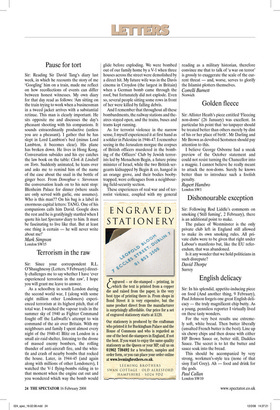Terrorism in the raw
Sir: Since your correspondent R.L. O’Shaughnessy (Letters, 9 February) directly challenges me to say whether I have ‘ever experienced terrorism in the raw’, I hope you will grant me leave to answer.
As a schoolboy in south London during the second world war, I (along with some eight million other Londoners) experienced terrorism at its highest pitch, that of total war. I watched the vapour trails in the summer sky of 1940 as Fighter Command fought off the Luftwaffe’s attempt to win command of the air over Britain. With my neighbours and family I spent almost every night of the 1940-41 Blitz on London in a small air-raid shelter, listening to the drone of massed enemy bombers, the rolling thunder of anti-aircraft fire, and the whistle and crash of nearby bombs that rocked the house. Later, in 1944-45 (and again along with millions of other Londoners), I watched the V-1 flying-bombs riding in to that moment when the engine cut out and you wondered which way the bomb would glide before exploding. We were bombed out of our family home by a V-1 when three houses across the street were demolished by a direct hit. My future wife was in the Davis cinema in Croydon (the largest in Britain) when a German bomb came through the roof, but fortunately did not explode. Even so, several people sitting some rows in front of her were killed by falling debris.
And I remember that throughout all these bombardments, the railway stations and theatres stayed open, and the trains, buses and trams kept running.
As for terrorist violence in the narrow sense, I myself experienced it at first hand as a soldier in Palestine in 1946-47. I remember seeing in the Jerusalem morgue the corpses of British officers murdered in the bombing of the Officers’ Club by Jewish terrorists led by Menachem Begin, a future prime minister of Israel, while the two British sergeants kidnapped by Begin & co, hanged in an orange grove, and their bodies boobytrapped, were colleagues from a neighbouring field-security section.
These experiences of real war and of ter
pecihlflumn2007byt
rorist violence, coupled with my general reading as a military historian, therefore convince me that to talk of ‘a war on terror’ is grossly to exaggerate the scale of the current threat — and, worse, serves to glorify the Islamist plotters themselves.
Correlli Barnett
Norwich


















































































 Previous page
Previous page